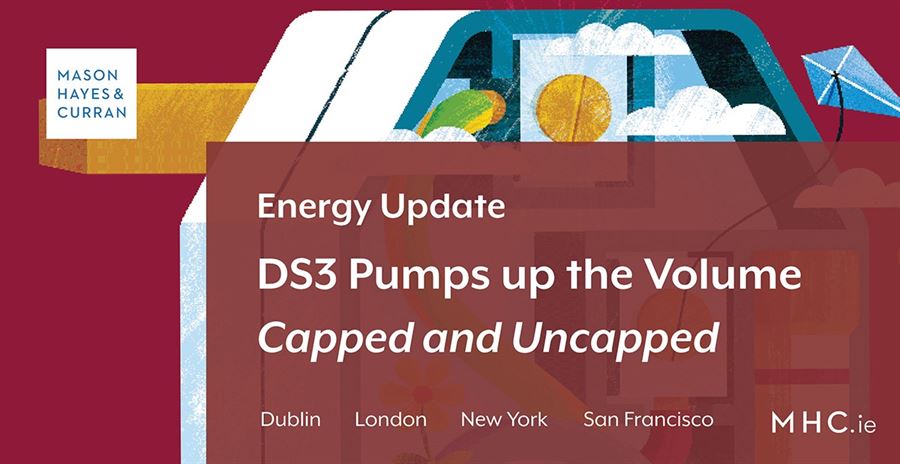
The operators of the Irish and Northern Irish electricity transmission systems, EirGrid and SONI, have since 2011 operated the “Delivering a Secure, Sustainable Electricity System” (DS3) programme by which technical electricity system services are procured. The DS3 programme has been formulated in order to meet the challenges of increasing Ireland’s renewable generation share while maintaining a safe and secure electricity grid, and has recently entered a new intensive phase of implementation.
The programme is now divided into two separate procurement streams – Volume Capped and Volume Uncapped Contracts. This approach has enabled EirGrid and SONI to increase the maximum levels of renewable generation that may be accommodated on the Irish grid from 50% to 65%, with the ultimate target being 75%.
Volume Capped Contracts
The DS3 Volume Capped Contracts relate to the delivery of Fast Frequency Response and Tertiary Operating Reserve Services. The procurement of these contracts is divided into two stages; a pre-qualification stage and an auction stage. Although the process is described as technology neutral, Battery Energy Storage Systems (BESS) are anticipated to secure the majority of the awarded contracts.
Following the conclusion of the Pre-Qualification Process, the tender process began in early June 2019. The contracts are to be awarded on a fixed term basis for a maximum period of six years with final contract signing due to take place on 1 September 2019. The auction will provide a route-to-market for between 91 and 140 MW of fast responding battery energy storage by September 2021, with projects up to 50MW being awarded a contract. The date of 1 September 2021 allows for a two year build programme from the point of contract execution.
![]() As the procurement of Volume Capped Contracts is effectively complete, all that remains is to await the results of the process and the assessments of the transmission system operators as to whether it has been successful. The difficulty of encouraging novel forms of electricity assets is evident from the fact that two regulatory issues have been ongoing during the Volume Capped Contracts procurement process:
As the procurement of Volume Capped Contracts is effectively complete, all that remains is to await the results of the process and the assessments of the transmission system operators as to whether it has been successful. The difficulty of encouraging novel forms of electricity assets is evident from the fact that two regulatory issues have been ongoing during the Volume Capped Contracts procurement process:
- EirGrid and SONI felt it necessary to publish, in June 2019, guidance on interactions between BESS assets and the Single Electricity Market. Notably, the guidance indicated a degree of fluidity in how these interactions are to be implemented.
- Meanwhile Ireland’s energy regulator, the Commission for Regulation of Utilities, has also determined that the treatment of electricity storage assets, insofar as this relates to the incidence of the Public Service Obligation (PSO) levy, needs to be changed in order to avoid certain instances of “double charging”. It has directed EirGrid to develop and document procedures to determine how the maximum import capacity is to be determined for storage units, for the purpose of the PSO.
Any uncertainty or instability in the regulatory treatment of BESS assets will not have encouraged the participation of these assets in the Volume Capped procurement process. It can only be hoped that sufficient participants have reached a position of comfort with Ireland’s regulatory framework, notwithstanding these issues.
Volume Uncapped Contracts
The Volume Uncapped procurement process applies to a separate range of technical system services from those procured under the Volume Capped Contracts process, and is open to any party seeking to provide one of the relevant services and for which they are a proven technology. In total, fourteen types of system service are being procured, with Volume Uncapped Contracts being given for a period of five years.
The procurement process involves a qualification system which requires interested parties to submit a response to EirGrid before being considered for the provision of the relevant services. The qualification system runs until April 2023 and is broken down into Phase 1 and Phase 2. The procurement of eleven services “went live” under Phase 1 in May 2018, while the procurement of Firm Frequency Response subsequent “went live” under Phase 2 in October 2018.
Unlike Volume Capped Contracts, whose procurement is largely complete, tenderers have repeated opportunities to apply for Volume Uncapped Contracts, under an iterative gate process. It is intended that specific contracts under this process will be awarded every six months.
Comment
The move towards greater reliance, on the island of Ireland, on non-synchronous renewable generation holds significant technical challenges for the system operators, which they are seeking to resolve by the procurement of system services through the competitive DS3 mechanisms.
The review of DS3 contracts has become a standard feature of commercial life for onshore Irish wind farms, as asset owners and operators seek to extract additional project revenues, while seeking comfort in relation to the commercial and legal risks that may be involved. Meanwhile, the Volume Capped DS3 procurement process now promises to unlock the widespread rollout of BESS assets – an asset class not previously seen in large numbers in Ireland.
The current DS3 programme is calibrated to assist in the achievement of Ireland’s 40% renewable electricity target for 2020. The industry awaits both the outcome of this procurement process, and also an indication of what steps will be deployed by the system operators in order to reach the far more challenging 70% target for 2030, as announced in the Climate Action Plan published by the Irish government in July 2019.
For more information on the commercial opportunities and risks under the DS3 programme, please contact a member of our Energy & Utilities team.
The content of this article is provided for information purposes only and does not constitute legal or other advice.



